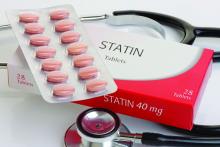The FDA Adverse Event Reporting System database Quarterly Data Files (Q1 2004 to Q3 2017) published by the FDA (downloaded in February 2018) was used to evaluate the adverse events associated with statin therapy. Among the seven statins looked at in this study, atorvastatin and rosuvastatin contributed to both the most cases of musculoskeletal adverse events and also to some of the shortest times to onset; atorvastatin was associated with 454 cases and a median time to onset of 24.5 days, and rosuvastatin was associated with 413 cases and a median time to onset of 30 days. Simvastatin also contributed to a large number of cases (409), but the median time to onset was significantly faster with the other two statins according to a Steel-Dwass test.
The study also looked at whether and how much concomitant use of nonstatin drugs affected time to onset, but it found that none of the drugs evaluated in the study had an effect on time to onset.
Read more about this study in Pharmacology Research & Perspectives.


